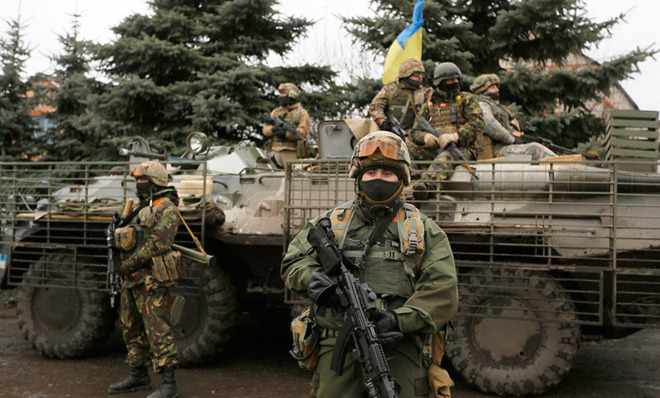10 things you need to know today: December 27, 2014


- 1. Ukraine, rebels exchange POWs as Kiev suspends Crimea travel
- 2. U.S. to share North Korea intel with South Korea, Japan
- 3. Top al Shabab militant surrenders to officials in Somalia
- 4. Putin signs new military doctrine naming NATO as top threat
- 5. Saudi Arabia to try female drivers in terrorism court
- 6. Visa, MasterCard halt services in Crimea
- 7. Egypt reportedly bans Exodus: Gods and Kings film
- 8. West Virginia quarterback retires because of concussions
- 9. Legendary jazz clarinetist Buddy DeFranco dies at age 91
- 10. Humans' skeletons became more fragile with switch to farming
A free daily email with the biggest news stories of the day – and the best features from TheWeek.com
You are now subscribed
Your newsletter sign-up was successful
1. Ukraine, rebels exchange POWs as Kiev suspends Crimea travel
The Ukrainian government agreed to trade more than 200 pro-Russian separatist prisoners of war for 150 Ukrainian servicemen on Friday. But, Kiev also announced it would halt all train and bus transportation services to Crimea, citing "deteriorating" security in the region that was annexed by Russia in March. Because Crimea's only land link is with Ukraine, and Kiev has already banned sea and air traffic, the new suspensions will effectively create a transportation blockade to the peninsula.
2. U.S. to share North Korea intel with South Korea, Japan
The United States will sign a joint intelligence-sharing pact with South Korea and Japan next week, officials said on Friday. While the U.S. already swaps intelligence with both nations, the new agreement will allow South Korea and Japan to share information on North Korea's nuclear and missile programs via America. The pact will also allow all three nations to more swiftly respond to North Korea's attempts to manufacture nuclear warheads.
The Week
Escape your echo chamber. Get the facts behind the news, plus analysis from multiple perspectives.

Sign up for The Week's Free Newsletters
From our morning news briefing to a weekly Good News Newsletter, get the best of The Week delivered directly to your inbox.
From our morning news briefing to a weekly Good News Newsletter, get the best of The Week delivered directly to your inbox.
3. Top al Shabab militant surrenders to officials in Somalia
Zakariya Ahmed Ismail Hersi, a top intelligence figure in al Qaeda-linked group al Shabab, reportedly surrendered to Somali officials on Saturday. The U.S. state department offered a $3 million reward in June 2012 for information leading to Hersi's arrest; his surrender comes just two days after al Shabab militants attacked an African Union peacekeeping base in Somalia.
4. Putin signs new military doctrine naming NATO as top threat
Saying a buildup of NATO forces near its borders could be used for "political and military pressure," Russian President Vladimir Putin signed a new military doctrine on Friday that points to NATO as the country's top military threat. Unlike a 2010 version of Russia's military doctrine, the new document gives Moscow room to use precision conventional weapons "as part of strategic deterrent measures," although it does not outline exactly how or when the Kremlin would be able to resort to such actions. NATO said it "poses no threat to Russia or to any nation."
A free daily email with the biggest news stories of the day – and the best features from TheWeek.com
5. Saudi Arabia to try female drivers in terrorism court
Activists say that two Saudi women arrested for driving nearly a month ago will be tried in a terrorism court. Saudi Arabia is the only country in the world that forbids women from driving, and while it is not technically illegal for women to drive, they cannot receive driving licenses in the country, so they face fines or even arrests if caught driving by police. Activists say that Loujain al-Hathloul, 25, and Maysa al-Amoudi, 33, have had their cases transferred to the terrorism court because of comments they made on social media, not their driving infractions.
6. Visa, MasterCard halt services in Crimea
Visa and MasterCard, the world's two biggest payment networks, both announced on Friday that they will be stopping services in Crimea. "Visa is now prohibited from offering Visa-branded products and services to Crimea," the company said in a statement. "We can no longer support card-issuing and merchant/ATM acquiring services." The U.S. has been imposing sanctions since Russian President Vladimir Putin annexed the Crimean peninsula from Ukraine in March.
7. Egypt reportedly bans Exodus: Gods and Kings film
Citing historical falsehoods and a pro-Zionist view, Gaber Asfour, Egypt's culture minister, reportedly said that Exodus: Gods and Kings will be banned from being shown in the country. Morocco has also reportedly banned the film, which stars Christian Bale as Moses and Joel Edgerton as Egyptian Pharaoh Ramses. The film has reportedly already grossed $46 million in the U.S., along with another $62 million in 39 international markets, since its release in mid-December.
8. West Virginia quarterback retires because of concussions
Saying "it would be dangerous for me to be out there," West Virginia quarterback Clint Trickett announced on Friday that he will sit out of Monday's Liberty Bowl against Texas A&M because of concussions. Trickett said he has sustained five concussions over the last 14 months, and he indicated that West Virginia's medical staff was not immediately made aware of all of the injuries. "That was on me," Trickett said of not reporting the concussions. "If they would have known, they probably would have been more cautious about it, but I was trying to push through it."
9. Legendary jazz clarinetist Buddy DeFranco dies at age 91
Legendary jazz clarinetist Buddy DeFranco died at age 91 on Wednesday in a Panama City hospital, his family confirmed on Friday. DeFranco's wife Joyce said he had been suffering poor health for several years. DeFranco collaborated with musicians such as Frank Sinatra, Billie Holiday, Art Tatum, Ella Fitzgerald and Tony Bennett. He had been named a Living Jazz Legend at at Kennedy Center ceremony, and was recognized 16 times as the top jazz clarinetist in the world.
10. Humans' skeletons became more fragile with switch to farming
Two new studies suggest that our ancestors' transition to farming from hunting and gathering caused humans' skeletons to become much weaker. One study found that about 12,000 years ago, when humans began to incorporate agriculture into their communities, their networks of spongy bone at joints became less dense. In the second study, scientists noted that the farmers they studied continued to eat the same diets as their hunter-gatherer ancestors, but they walked much less and led relatively sedentary lifestyles.
Sarah Eberspacher is an associate editor at TheWeek.com. She has previously worked as a sports reporter at The Livingston County Daily Press & Argus and The Arizona Republic. She graduated from Northwestern University's Medill School of Journalism.
-
 Political cartoons for February 16
Political cartoons for February 16Cartoons Monday’s political cartoons include President's Day, a valentine from the Epstein files, and more
-
 Regent Hong Kong: a tranquil haven with a prime waterfront spot
Regent Hong Kong: a tranquil haven with a prime waterfront spotThe Week Recommends The trendy hotel recently underwent an extensive two-year revamp
-
 The problem with diagnosing profound autism
The problem with diagnosing profound autismThe Explainer Experts are reconsidering the idea of autism as a spectrum, which could impact diagnoses and policy making for the condition
-
 10 things you need to know today: January 24, 2024
10 things you need to know today: January 24, 2024Daily Briefing Trump closes in on nomination with New Hampshire win over Haley, 'Oppenheimer' leads the 2024 Oscar nominations, and more
-
 10 things you need to know today: January 23, 2024
10 things you need to know today: January 23, 2024Daily Briefing Haley makes last stand in New Hampshire as Trump extends polling lead, justices side with US over Texas in border fight, and more
-
 10 things you need to know today: January 22, 2024
10 things you need to know today: January 22, 2024Daily Briefing DeSantis ends his presidential campaign and endorses Trump, the US and Arab allies push plan to end Gaza war, and more
-
 10 things you need to know today: January 21, 2024
10 things you need to know today: January 21, 2024Daily Briefing Palestinian death toll reportedly passes 25,000, top Biden adviser to travel to Egypt and Qatar for hostage talks, and more
-
 10 things you need to know today: January 20, 2024
10 things you need to know today: January 20, 2024Daily Briefing Grand jury reportedly convened to investigate Uvalde shooting response, families protest outside Netanyahu's house as pressure mounts for hostage deal, and more
-
 10 things you need to know today: January 19, 2024
10 things you need to know today: January 19, 2024Daily Briefing Congress averts a government shutdown, DOJ report cites failures in police response to Texas school shooting, and more
-
 10 things you need to know today: January 18, 2024
10 things you need to know today: January 18, 2024Daily Briefing Judge threatens to remove Trump from his defamation trial, medicine for hostages and Palestinians reach Gaza, and more
-
 10 things you need to know today: January 17, 2024
10 things you need to know today: January 17, 2024Daily Briefing The US strikes Houthi targets in Yemen a third time, Trump's second sex defamation trial begins, and more
